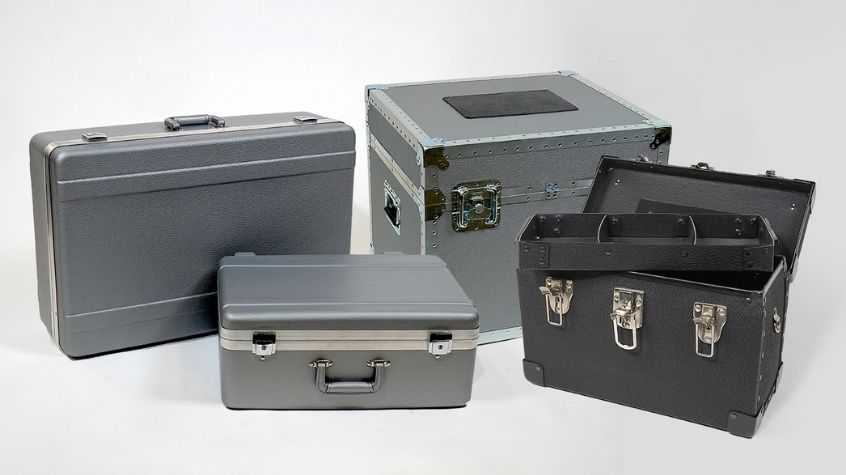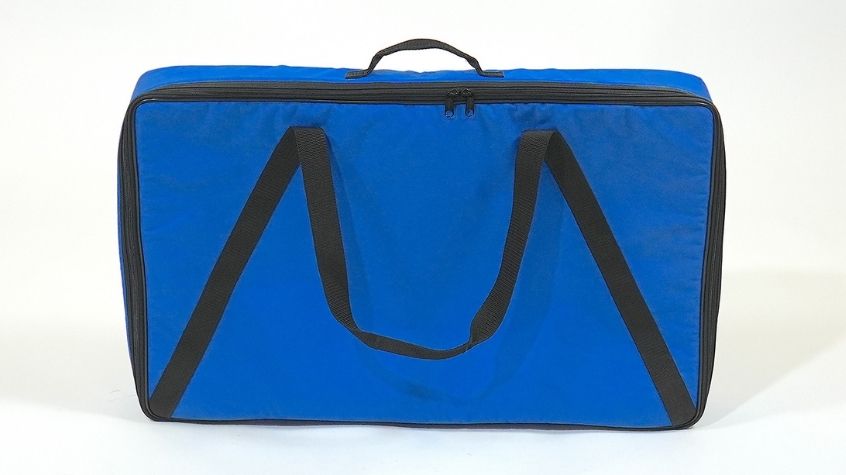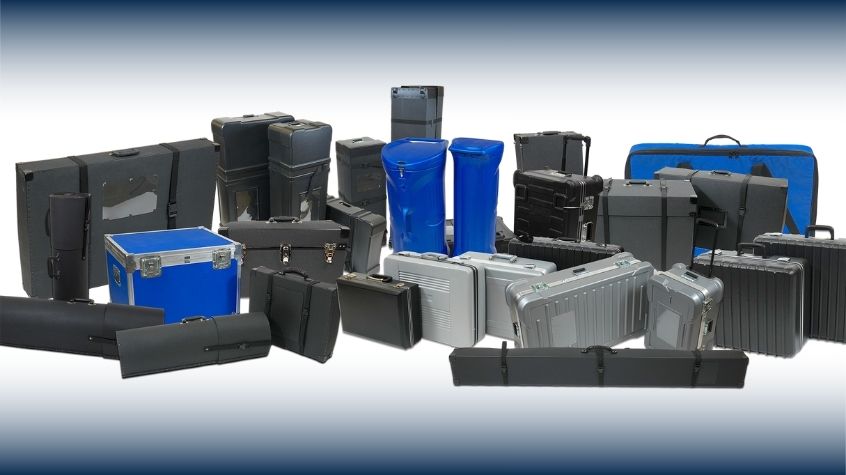Since our ancestors started using tools, we’ve understood the critical importance of reliable, secure, and capacious carrying and storage solutions. If you’ve ever traveled with sensitive or valuable equipment, you know the case you choose matters just as much as what’s inside it. When it comes to hard cases vs. soft cases, the considerations are many.
If your gear is fragile, expensive, or headed through airports and shipping hubs, hard cases give you the best protection. If you’re more concerned with traveling light and keeping things easy to carry, soft cases are usually the way to go. In fact, many professionals will keep both on hand and choose whichever makes the most sense for the trip. The truth is, all have their place. It will all depend on what your needs and preferences are.
At Case Design Corp., we’ve built everything from custom shipping cases for trade shows to custom road cases for touring productions. In this post, we’ll explore what makes hard cases and soft cases different, and how to make the right choice for your needs.
Let’s jump right in.
What Are Hard Cases?

Hard cases are built with rigid materials such as molded plastic, fiberglass, aluminum, and so on. They’re designed to take a beating so that your valuable and sensitive equipment doesn’t have to. Whether it’s a hard shipping case with wheels that can survive a potentially tumultuous airport baggage system, or a fully custom protective case designed for delicate instruments, hard cases are all about maximum protection.
Industries such as aerospace, defense, and healthcare lean heavily on custom road cases. A surgeon shipping diagnostic equipment, or a medical supplier delivering imaging devices, simply can’t afford a cracked lens or damaged screen. For them, reliability isn’t optional; it’s essential.
The same goes for professionals in broadcasting and live entertainment, where soundboards, lighting rigs, and cameras are constantly on the move. Industrial and manufacturing companies also depend on custom protective cases to transport sensitive tools and calibration instruments to job sites without risk. Even marketing teams often use trade show shipping cases to keep booth structures and monitors safe while moving from city to city.
And of course, travel photographers count on hard cases too. Lenses, drones, and cameras are expensive and delicate; dropping a bag on the tarmac shouldn’t mean the end of a project.
What Are Soft Cases?

By contrast, soft cases — sometimes called padded bags or a padded case — are lightweight, flexible, and easy to carry. They’re usually made with durable fabrics like nylon or polyester and lined with padding to absorb bumps and scratches.
While they may not be as resistant to hard knocks as their counterparts, what they lack in toughness they more than make up for in convenience. Marketing professionals often use soft cases to haul brochures, giveaways, or portable displays to client meetings. Industrial salespeople use padded bags to carry product samples from one stop to the next without dragging bulky gear.
The Key Differences: Hard Cases vs. and Soft Cases
The differences between hard cases and soft cases boil down to four main areas:
- Protection: Hard cases are built for impact resistance, water resistance, and long-distance travel. They can handle drops, rough handling, and extreme environments. Soft cases, on the other hand, offer moderate protection — enough to keep scratches, dings, and dust at bay, but not enough to withstand major impact.
- Weight: Soft cases are lighter and easier to carry. Hard cases tend to be heavier, but features like wheels and handles (such as hard shipping cases with wheels) make them manageable even when packed full with gear.
- Durability: A custom protective case is designed to last years, even decades. Soft cases are more affordable upfront, but will usually wear out faster with constant travel.
- Customization: Hard cases can be fully customized with foam inserts, compartments, and branding. Soft cases are more limited in customization but can still be tailored to size or fabric style.
Industries That Rely on Hard and Soft Cases
Different industries face very different challenges when it comes to protecting and transporting equipment. Some require rugged, military-grade cases that can withstand extreme conditions, while others benefit more from lightweight, portable soft cases for everyday use. Here’s how each type is commonly applied:
Industries that rely on hard cases
- Aerospace & Defense: Avionics, navigation instruments, and mission-critical gear need protection against vibration, pressure changes, and harsh environments.
- Medical & Pharmaceutical: Diagnostic equipment, imaging devices, and monitoring tools are kept sterile and damage-free in precision-engineered protective cases.
- Military: Communications gear, weapons components, and tactical tools travel in rugged, weather-resistant custom cases built for field use.
- Trade Shows & Events: Heavy booth structures, monitors, lighting rigs, and electronics ship in durable trade show shipping cases designed for repeated transport.
- OEM & Industrial Manufacturing: Precision instruments, testing devices, and calibration tools are secured in custom cases that shield against dust, vibration, and impact.
Industries that depend on soft cases
- Sales & Marketing: Reps carry brochures, samples, and demo kits in padded bags that are lightweight and convenient for travel between meetings.
- Consumer Products: Branded soft cases offer protection and portability for electronics, lifestyle items, and sports equipment.
- Communications & Media: Journalists, photographers, and content creators use padded bags for laptops, cameras, and accessories that need quick access.
- Trade Shows (light gear): Staff often use soft cases for handouts, giveaways, and small electronics while heavier equipment is shipped in hard cases.
Why both types matter at trade shows
Trade shows highlight why both solutions exist. Booth structures, displays, and electronics almost always require rugged shipping cases to arrive intact. Meanwhile, staff on the floor carry lightweight soft cases for marketing materials, giveaways, and personal tools they need handy. Ultimately, the right choice comes down to what you need to protect, how it will be used, and the environments it must withstand.
Final Thoughts: The Case Design Corp. Advantage
Choosing the right case isn’t just about picking between “hard” and “soft”; it’s about making sure the case you choose is built around your specific needs and can get the job done the way you need it to. That’s where Case Design Corp. comes in. We create custom shipping cases, custom road cases, and custom protective cases that are tailored to your gear, your workflow, your style, and your brand. Whether you need a hard shipping case with wheels that can cross continents or a lightweight padded case for quick trips around the neighborhood, we’ll design a solution that works.
So, which is better: hard cases or soft cases? The answer depends on your gear and how you use it. Hard cases are unbeatable for long-term durability, rugged protection, and custom fit. Soft cases are great for lightweight travel, daily use, and convenience. In many situations, the best approach is to have both in your toolkit. Whatever your needs, there’s a solution for you.
At Case Design Corp., we’re here to help you figure out which option, or combination of hard cases vs. soft cases, makes the most sense for you, your business, or your clients. Contact us today to get started!



